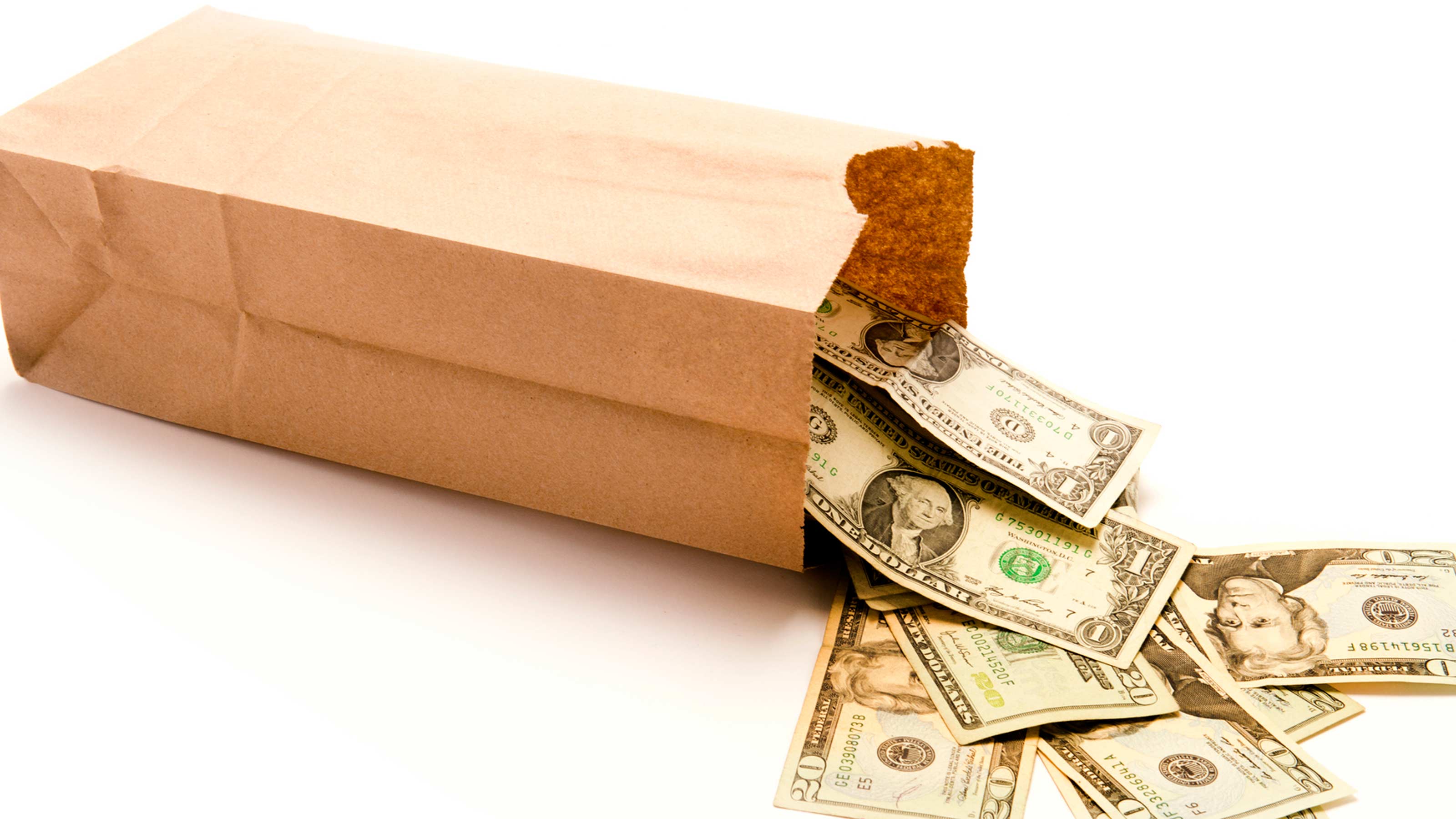Would You Pack Your Lunch for $1.2 Million?
Buying lunch every workday might cost you a lot more than you think in retirement savings over the course of your career.


Profit and prosper with the best of Kiplinger's advice on investing, taxes, retirement, personal finance and much more. Delivered daily. Enter your email in the box and click Sign Me Up.
You are now subscribed
Your newsletter sign-up was successful
Want to add more newsletters?

Delivered daily
Kiplinger Today
Profit and prosper with the best of Kiplinger's advice on investing, taxes, retirement, personal finance and much more delivered daily. Smart money moves start here.

Sent five days a week
Kiplinger A Step Ahead
Get practical help to make better financial decisions in your everyday life, from spending to savings on top deals.

Delivered daily
Kiplinger Closing Bell
Get today's biggest financial and investing headlines delivered to your inbox every day the U.S. stock market is open.

Sent twice a week
Kiplinger Adviser Intel
Financial pros across the country share best practices and fresh tactics to preserve and grow your wealth.

Delivered weekly
Kiplinger Tax Tips
Trim your federal and state tax bills with practical tax-planning and tax-cutting strategies.

Sent twice a week
Kiplinger Retirement Tips
Your twice-a-week guide to planning and enjoying a financially secure and richly rewarding retirement

Sent bimonthly.
Kiplinger Adviser Angle
Insights for advisers, wealth managers and other financial professionals.

Sent twice a week
Kiplinger Investing Weekly
Your twice-a-week roundup of promising stocks, funds, companies and industries you should consider, ones you should avoid, and why.

Sent weekly for six weeks
Kiplinger Invest for Retirement
Your step-by-step six-part series on how to invest for retirement, from devising a successful strategy to exactly which investments to choose.
It's easy to eat lunch out. It's convenient. It's a nice break from work, and, boy, is it delicious. And how much does it cost? Not much at all. "Just a few dollars." Well, that's what marketers want you to think. The marketing industry spends its life convincing you that it's just "a few dollars" to enjoy a great lunch out. The reality is, it costs you much, much more. Let's take a look at exactly how much.
One day awhile back, before the COVID-19 pandemic, I went to lunch, stopped off at Panera, had a salad and a drink, and the cost was $14.50. Heck, that's not that much, $14.50 for lunch. That's less than a movie in most places these days. And it was tasty and convenient. But what if I had just brought something from home? How much could I save? The real question you need to ask is, "How do compounding interest and compounding savings work over time to my advantage?" Let's look at the numbers.
How Lunch Out Can Add Up Fast
If you ate lunch out every day and spent just $14.50, it may not seem out of your budget, but it adds up. Multiply that by five workdays, $14.50 a day turns into $72.50 a week, which comes out to $3,770 a year. Compare that to a typical lunch from home, which might cost about $3 a day, $15 a week and only $780 per year.
From just $107.88 $24.99 for Kiplinger Personal Finance
Become a smarter, better informed investor. Subscribe from just $107.88 $24.99, plus get up to 4 Special Issues

Sign up for Kiplinger’s Free Newsletters
Profit and prosper with the best of expert advice on investing, taxes, retirement, personal finance and more - straight to your e-mail.
Profit and prosper with the best of expert advice - straight to your e-mail.
Hold on; it gets worse. Over 40 years, if you ate home-cooked lunches, you would have spent $31,200. While that might sound like a lot, it’s $119,600 less than what you’d pay for restaurant meals, which add up to a grand total of $150,800. Now that is a lot of money. The marketing gurus don't want you looking at the $150,800 amount. They want you to look at the $14.50 amount. But would you pack a lunch if it saved you $119,600?
What if it saved you over $1.2 million? Let me show you what I mean.
Next, Factor in Taxes and 401(k) Savings
Remember, when you buy lunch at $14.50, you're using money that came out of your paycheck that has already been taxed. If you're in the 22% tax bracket, then you're going to lose 22% federal and maybe 5% more in state taxes per paycheck. That's 27% of your paycheck, gone. So that means that $14.50 in “after tax” lunch money actually costs you $19.86 of your “before taxed” earnings from your paycheck.
Why is that important? Well, what if that $19.86 went directly into savings without being taxed? You can do that by putting that money into your 401(k). Now, at the end of the year instead of a savings of $3,770/year ($14.50/day for lunch x 5 days/week x 52 weeks/year), you'd have actually saved $5,164/year — this reflects the tax savings, which would go directly into your 401(k) along with the $14.50 cost of lunch ($19.86/day for lunch x 5 days/week x 52 weeks/year).
But it gets even better. Many employers offer to match your contributions. The most common match is 50 cents on the dollar, up to 6% of pay. This means instead of eating lunch for $14.50 a day, you could add $5,164 a year into your 401(k). And if your employer matches your contribution at 50 cents on the dollar, you would be adding a total of $7,745/year into your 401(k). That's a lot of money for lunch.
Finally, Figure in Compound Interest
But wait, there’s more! That money doesn’t just sit in your 401(k). It grows. Let’s say you start contributing this money to your 401(k) when you are 25, and let that money grow for 40 years with a return of 6.75%, which is on trend with what the market's done over time. At $14.50 a meal, $3,770 a year, times 40 years, you have saved $150,800 by age 65. But if you would have invested that money, pre-taxed, in your 401(k) with you company’s match, over 40 years, your 401(k) could have grown to $1,547,919! What would your $3 home-cooked meals add up to under similar circumstances? Just $320,340. So, subtracting that, you see that by brown-bagging it, you could have saved a grand total of $1,227,579.
Over $1.2 million saved for retirement by not eating lunch out. Would you pack your lunch for $1.2 million?
So, what's the takeaway? The takeaway is marketers have spent years honing their craft to convince you to buy their products and have you look at it in terms of a daily, weekly or monthly cost in order to keep the price very low in your eyes. When you buy a car, they don't talk to you about the total price of the car. All their effort is focused on convincing you that monthly cost is within your budget. They don't want you to add up all the car's costs, plus tax, plus interest over the life of your loan. It's the same with your lunches!
This $14.50 lunch is actually costing you just shy of $20 in pre-taxed earned income that you've worked for. Just shy of $40/lunch when you add in your employer's matching contribution — which could turn into over $1.5 million by retirement. Now, over 40 years, that turns into a total of 10,400 lunches. Which means the true cost of each lunch is not $14.50 but $148.84 ($1.5 million+/ 10,400 lunches = $148.84/lunch).
How is that possible? It's the power of compounded interest and compounded savings over an extended period of time. Just like water trickling, over years and years, created the Grand Canyon. You can use that same power of consistent savings and compounding interest to generate a retirement nest egg that you could never outlive, but it starts with understanding the numbers. So, $14 for lunch or $1.5 million in retirement?
Profit and prosper with the best of Kiplinger's advice on investing, taxes, retirement, personal finance and much more. Delivered daily. Enter your email in the box and click Sign Me Up.

Dave Lopez is the Founder of ILG Financial, which has been in business for over 11 years and he has built out hundreds of Retirement Plans. Dave is a Fiduciary Investment Advisory and holds a Life, Long Term Care, and Annuity License. He has his own radio show, "Retire Your Way with Dave Lopez," currently available as a podcast. He is also a best-selling co-author of the Amazon book "Mama's Secret Recipe for Retirement Success" with Jack Canfield and has been featured in many finance periodicals.
-
 Ask the Tax Editor: Federal Income Tax Deductions
Ask the Tax Editor: Federal Income Tax DeductionsAsk the Editor In this week's Ask the Editor Q&A, Joy Taylor answers questions on federal income tax deductions
-
 States With No-Fault Car Insurance Laws (and How No-Fault Car Insurance Works)
States With No-Fault Car Insurance Laws (and How No-Fault Car Insurance Works)A breakdown of the confusing rules around no-fault car insurance in every state where it exists.
-
 Why Picking a Retirement Age Feels Impossible (and How to Finally Decide)
Why Picking a Retirement Age Feels Impossible (and How to Finally Decide)Struggling with picking a date? Experts explain how to get out of your head and retire on your own terms.
-
 For the 2% Club, the Guardrails Approach and the 4% Rule Do Not Work: Here's What Works Instead
For the 2% Club, the Guardrails Approach and the 4% Rule Do Not Work: Here's What Works InsteadFor retirees with a pension, traditional withdrawal rules could be too restrictive. You need a tailored income plan that is much more flexible and realistic.
-
 Retiring Next Year? Now Is the Time to Start Designing What Your Retirement Will Look Like
Retiring Next Year? Now Is the Time to Start Designing What Your Retirement Will Look LikeThis is when you should be shifting your focus from growing your portfolio to designing an income and tax strategy that aligns your resources with your purpose.
-
 I'm a Financial Planner: This Layered Approach for Your Retirement Money Can Help Lower Your Stress
I'm a Financial Planner: This Layered Approach for Your Retirement Money Can Help Lower Your StressTo be confident about retirement, consider building a safety net by dividing assets into distinct layers and establishing a regular review process. Here's how.
-
 The 4 Estate Planning Documents Every High-Net-Worth Family Needs (Not Just a Will)
The 4 Estate Planning Documents Every High-Net-Worth Family Needs (Not Just a Will)The key to successful estate planning for HNW families isn't just drafting these four documents, but ensuring they're current and immediately accessible.
-
 Love and Legacy: What Couples Rarely Talk About (But Should)
Love and Legacy: What Couples Rarely Talk About (But Should)Couples who talk openly about finances, including estate planning, are more likely to head into retirement joyfully. How can you get the conversation going?
-
 How to Get the Fair Value for Your Shares When You Are in the Minority Vote on a Sale of Substantially All Corporate Assets
How to Get the Fair Value for Your Shares When You Are in the Minority Vote on a Sale of Substantially All Corporate AssetsWhen a sale of substantially all corporate assets is approved by majority vote, shareholders on the losing side of the vote should understand their rights.
-
 How to Add a Pet Trust to Your Estate Plan: Don't Leave Your Best Friend to Chance
How to Add a Pet Trust to Your Estate Plan: Don't Leave Your Best Friend to ChanceAdding a pet trust to your estate plan can ensure your pets are properly looked after when you're no longer able to care for them. This is how to go about it.
-
 Want to Avoid Leaving Chaos in Your Wake? Don't Leave Behind an Outdated Estate Plan
Want to Avoid Leaving Chaos in Your Wake? Don't Leave Behind an Outdated Estate PlanAn outdated or incomplete estate plan could cause confusion for those handling your affairs at a difficult time. This guide highlights what to update and when.